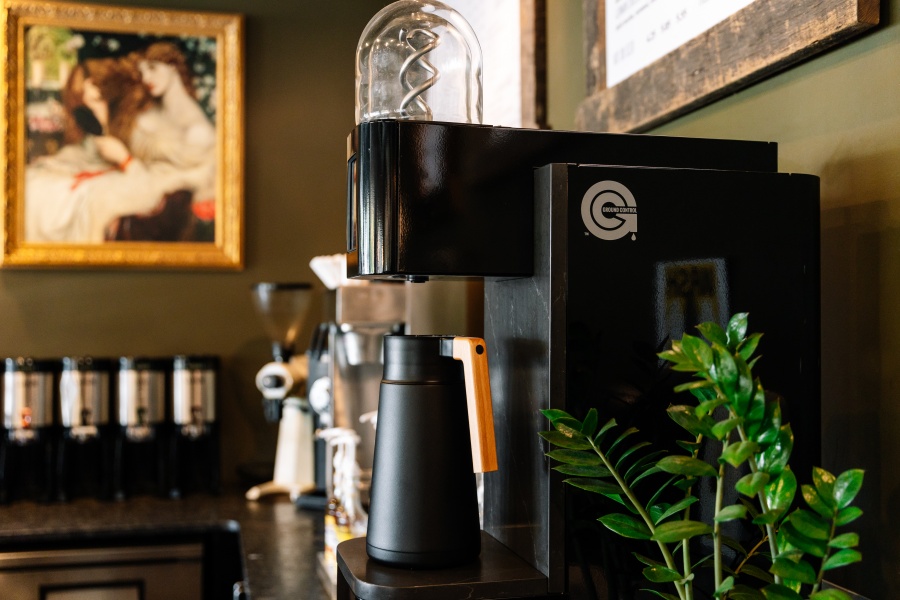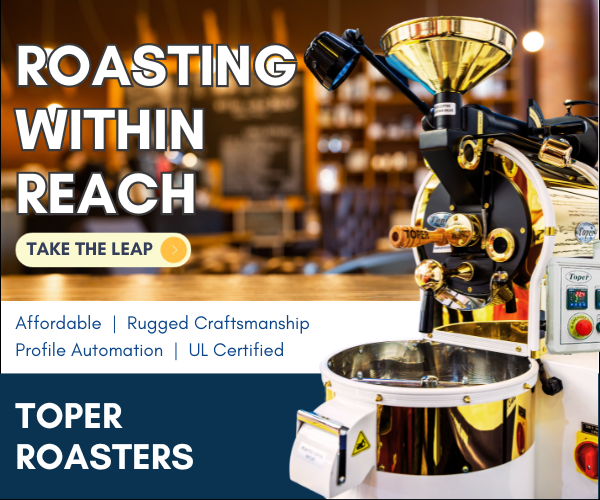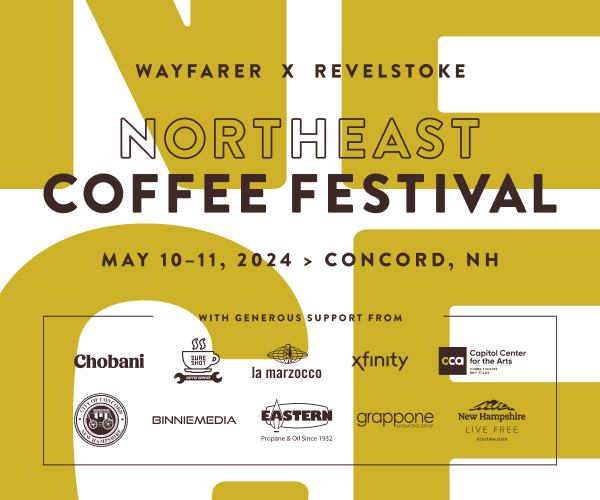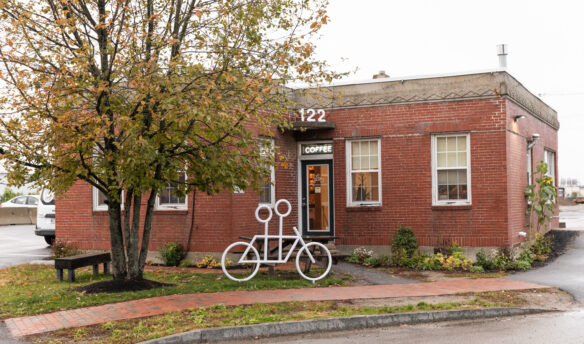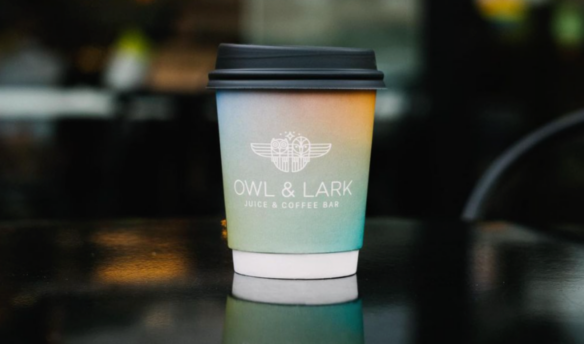[S]pecialty coffee shops tend to put manual brewing methods on a pedestal. Slower, handcrafted brewing methods like pour overs and espresso drinks made by baristas are often viewed as higher quality, and any form of automation is seen as a shortcut.
Yet, more and more folks are talking about tools, machines, and accessories that speed up or completely take over the brewing process. This is evidenced by the lineup of automatic hot and cold coffee brewers, espresso machines, and barista accessories at this year’s Specialty Coffee Association (SCA) Expo trade show. With machine manufacturers designing better and more efficient coffee tools, capable of making well-crafted drinks, automation is on the minds of coffee shop owners everywhere.
But automation doesn’t mean baristas will become obsolete. Instead, smart tools can help baristas display their knowledge and know-how while connecting with consumers. As consumer preferences shift towards high-quality convenience and costs rise in response to relentless global events, more coffee shops are leveraging automation and technology behind the bar to create a memorable experience for customers and baristas.
Automation for Consistency, Efficiency, and Barista Well-Being
While automated brewing technology can improve profits, this isn’t always a coffee shop’s priority. Many shop owners implement automation to enhance beverage consistency, bar flow efficiency, and barista well-being.
Beverage Consistency
In its nine locations across the greater Wilmington, Delaware area, Brew Haha! Coffee uses Ground Control batch brewers, volumetric settings on La Marzocco espresso machines, and other technology to ensure consistent coffee quality.
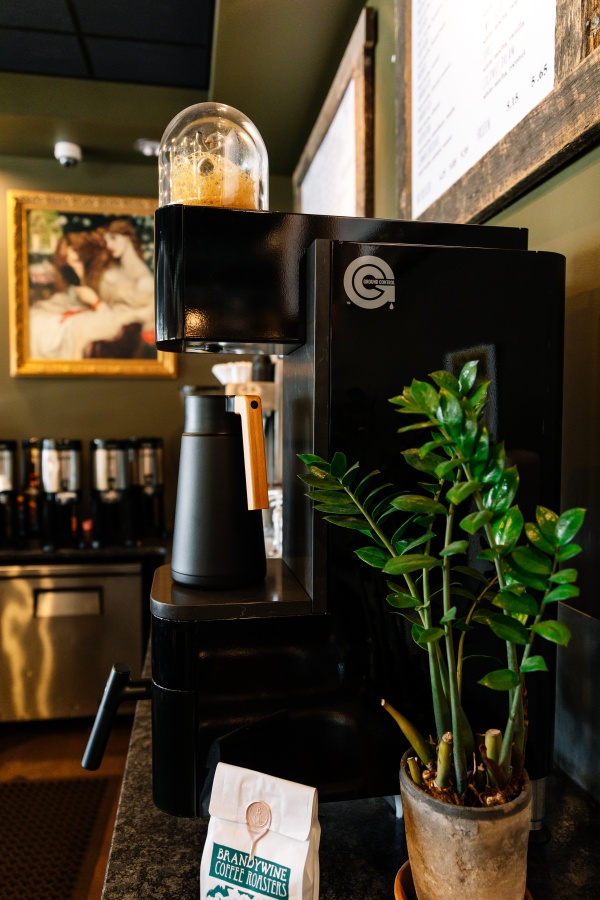
“With nine cafes, you want every shot or drink to taste the same, no matter what Brew Haha You go into” Jillian Willis, the Director of Operations at BrewHaha! explains.
There’s a commonly held fear that automation will decimate the craft of specialty coffee. Yet, brewing technology requires the skill of a trained barista to produce a beverage that adheres to industry standards and consumer preferences.
Volumetric espresso machines, gravimetric grinders, and automatic pour over brewers still need to be dialed in at the beginning of a shift. Once calibrated, however, baristas can rely on this equipment to produce a consistent beverage throughout the day, especially during the busiest rushes.
In turn, customers can rely on their favorite coffee shop to produce a delicious drink every time.
Efficiency
All baristas understand the anguish of hearing “I’ll have a pour over” while a line forms out the door. Instead of never-ending lines and impatient customers, coffee shops can rely on automation to speed up ticket times and get great coffee into the hands of their patrons quickly.
At Brew Haha, baristas also use the Ground Control’s coffee concentrate to batch brew iced lattes. Rather than pulling individual espresso shots per customer, baristas use the Ground Control to make a batch brewed coffee concentrate mixed with a customer’s choice of milk. This significantly reduces the time it takes to complete orders while simultaneously creating more opportunities for purposeful customer interactions.
“With drinks going out faster, it helps with our sales and with some labor costs too—there’s only so much two baristas can do. So, there is a financial advantage, but we’re seeing the value more in giving baristas a better quality of work,” Willis continued.
On top of throwing a wrench into the bar workflow, most customers aren’t willing to wait 10 minutes for a pour over or a seasonal drink. Tom Valentine, Wholesale & Quality Assurance Manager at Crema Coffee Roasters in Nashville, Tennessee, credits the disconnect between customer expectations and brewing realities as part of the reason why Crema added Marco SP9 pour over brewers to its bar.
“We noticed customers were confused as to why other customers were receiving their drinks before the pour over was done, even with an explanation from the baristas,” Valentine says. Once the baristas have set up the pour over equipment, The Marco SP9s speed up service by facilitating water distribution in the brewing process. A barista is able to set up multiple pour overs at once, but the convenience of the brewers doesn’t take away from the skill one needs to use and set up brewing parameters. “We still dial-in recipes and grinders and test quality regularly, but the Marco SP9s remedy the disconnect and expectations from customers while still maintaining our standards for quality.”
With automatic pour over brewers on a bar, baristas are no longer stuck managing the needs of a single drink as orders pile in. Brewers like the Marco SP9 give baristas the freedom to complete other brewing tasks and simultaneously engage with guests without sacrificing the quality of a pour over.
Barista Well-Being
Coffee shop technology is improving the experience for customers and baristas alike. Simple bar modifications such as the straight-in portafilters on a La Marzocco KB90 designed to reduce barista wrist injuries, automatic tampers like the PuqPress, and automatic milk steamers such as the Perfect Moose all work to reduce physical and mental barista fatigue.
Baristas can develop shoulder, wrist, foot, and back injuries from the repetitive motions involved in brewing coffee. Additionally, the emotional labor required of baristas in a fast-paced work environment can lead to anxiety, depression, and other mental health concerns. Automated machines aid coffee shops in cultivating a better, safer workplace for baristas.
Kevin Aquino of Brandywine Coffee Roasters and Brew Haha also explains, “Dialing in is hard enough for everyone, so taking away a couple of these variables gives the baristas more freedom to actually feel dialed in throughout the day. This enhances the quality of our coffee and provides a more sustainable workday for our baristas.”
Willis added, “If this technology allows our baristas to get through their shift without being overwhelmed and we can continue to share great coffee with our community, it’s a win for everybody.”
After experiencing the barista benefits of automation firsthand, Crema Coffee Roasters and Brew HaHa are considering future automated additions to their bar, such as the PuqPress.
Beyond the bottom line, technology that reduces the time and energy it takes to brew coffee allows baristas to create meaningful interactions that turn a first-time visitor into a coffee shop regular.
“The quality of our drinks is consistent and customers overall are really happy,” says Valentine.
Automation Won’t Decimate the Craft of Specialty Coffee
Coffee professionals are rightfully skeptical about automation. If a machine can do it, why would we need to hire baristas or roasters?
“After 30 years in business, we were hesitant about this technology,” Willis says. “But, this whole experience has opened our eyes to the benefits of using automation within the cafes.”
Valentine echoed this sentiment, noting that Crema Coffee Roasters wanted to ensure that the shop experience was still barista-centric.
“It’s a balance of understanding that automation will be helpful and that it doesn’t pull away from the craft,” Aquino mentioned. “I think automation is great for the industry, our staff, and customers alike. It’s pushing the boundaries of how creative and innovative our industry is and has to continuously evolve.”
For technology and automation to be truly successful and offer an unparalleled experience, it requires the expertise of a trained coffee professional. Volumetric machines and automatic pour overs need a barista to calibrate recipe parameters daily. Even electric roasters such as the Bellwether Roaster need a human to operate and monitor quality control for each batch.
Coffee shops are proving the future of automation is a perfect balance of barista talent and optimized technology, working in tandem to produce a well-rounded and tasty customer experience.
Anne Mercer is a freelance writer specializing in helping brands and individuals carve out their space in the specialty coffee industry. She is also the co-owner of Victus Coffee, based in West Hartford, Connecticut. Visit her website at annemercer.com.
Photos by Becca Mathias @beccamathiasphoto

